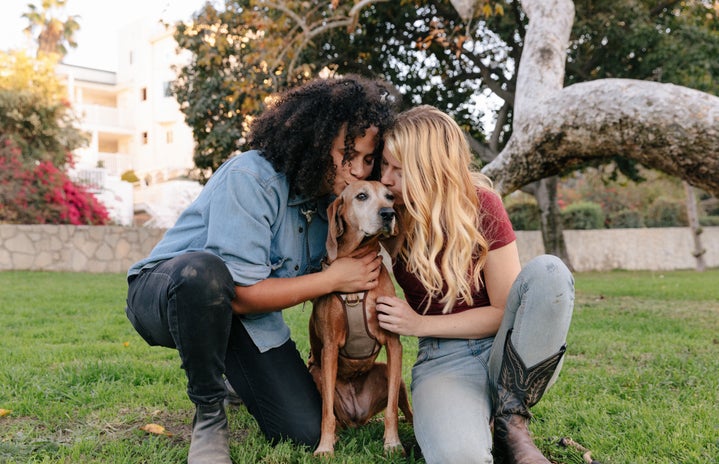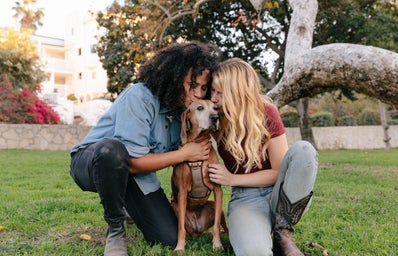This past April, while on a tour of Bradley University, I came across an abundance of student organizations and clubs. None immediately caught my eye until I saw a couple of wagging tails in vests standing around. This was the start of my journey with Bradley University’s very own facility-dog training group, Wags for Mags.
Wags for Mags is a completely student-led organization here at Bradley. This organization is teamed up with its parent organization, Paws Giving Independence (PGI). Wags for Mags started in 2012 and got its name from Stacie and Rob Bertram, who were both physical therapy professors at Bradley University. Wags for Mags is named in memory of their daughter, Maggie, who passed away in a car accident in March 2012. Maggie was a longtime volunteer of PGI and trained a service dog, Marley.
If you are looking to join Wags for Mags, it can be a very selective process. First, you must attend the bi-weekly training sessions (currently held every other Monday). From then on, you can either stay as a volunteer, pay the small fee to be a member, or work to become a student trainer — the highest position offered to students. I am currently in hopes of becoming a student trainer. Recently, I have been selected for the first round of tests. The wonderful thing about Wags for Mags is you can be as involved as you’d like! There are some people who come to a meeting every now and then, some people who strictly work with the fundraisers, or some people (such as me) who attend every training session and event held. There is no maximum or minimum time commitment needed to join!
What do we do in Wags for Mags? Depending on your role, you can do a variety of different things. Volunteers can help with fundraisers or come to the training sessions sometimes. Members usually attend every training session and try to be there for the fundraisers as well. Personally, I attend every bi-weekly meeting, training session and fundraiser. My goal is to become a student trainer. In training classes, you will learn a handful of commands the dogs should know. Typically, the meetings start out easy; certain commands such as sit, stay, and wait are taught. The more you attend the sessions, the more advanced they become. Eventually you are taught the various positions the dogs should know. In addition, you are taught the trickier commands like “line up” or “go through.” There are a multitude of different commands you as a trainer can learn; however, while you attend the sessions you will only learn specific ones needed to successfully handle a dog.
If you are selected to be a student trainer, which is where most of the time commitment comes from, there is a lengthy process you must go through to become certified. First, after weeks and weeks of observing everyone, the Wags for Mags student trainers will select a handful of people to be interviewed. This interview includes a 15-minute handling session, where you and a trainer go around campus or a building to see how well you manage a dog. The next part of the interview is a 15-minute questioning. During this questioning session a student trainer will ask you questions such as “Why do you want to be a part of Wags for Mags?” and “How did you hear about this organization?” If you are selected from the interview round, you move on to your first test with PGI. The first test consists of you and a group of other student trainers in a public setting, where you are all tested on your ability to handle dogs. The key component here is that PGI always has the final say in who becomes a student trainer.
If you pass your first test, congratulations! You are now ready to begin collecting your handling hours to become an official student trainer. Gaining these hours usually takes an entire semester. For example, I will begin collecting these hours next semester. That is, when I — hopefully — pass the first test. These hours include attending both PGI’s and Wags for Mag’s weekly training sessions. After you collect the specific number of hours, you move on to your next big test which is make or break. This test will confirm or reject you as a student trainer. From then on, you will also be able to become publicly certified to work with the dogs! This means that if you get your public certification, you can take the dog you are working with to class, on an errand run or even back home if you are specifically fostering a Wags’ dog!
While this process may seem lengthy and difficult, it is in the best interest of both you and the dog. Dogs need certified people that can handle them under any circumstance. Additionally, you, as a trainer, need to feel comfortable enough to handle them. The amount of time you must put into becoming a student trainer is important for both parties.
Even though I have only been a part of Wags for Mags for a brief time, I have learned so much! I have learned patience, compassion and a newfound love for teaching dogs. As an education major, and thus, a future teacher, you could say I am biased! However, the feeling I get after working with such brilliant dogs is so wonderful.
Not only is Wags for Mags an incredible organization, but their parent organization is just as amazing! The service and facility dogs at Paws Giving Independence benefit individuals with spinal cord injury, muscular dystrophy, arthritis, developmental delays, cerebral palsy, balance issues, and even more. PGI is run exclusively on public donations and endowments, and their dogs are free of charge for their recipients! The dogs PGI trains are typically unwanted shelter dogs or even strays in some cases. Their slogan “saving a life to change a life” is true to its core. Paws Giving Independence genuinely does save the lives of dogs to change the lives of those with disabilities, and that right there is my most favorite thing about the entire organization.
It is never too late to join Wags for Mags! We are always looking for new volunteers, members and especially student trainers! If you are interested in joining Wags for Mags, you can contact me or either of the Wags for Mags accounts below.
Email: bradley.wagsformags@gmail.com
Instagram: @wagsformags


